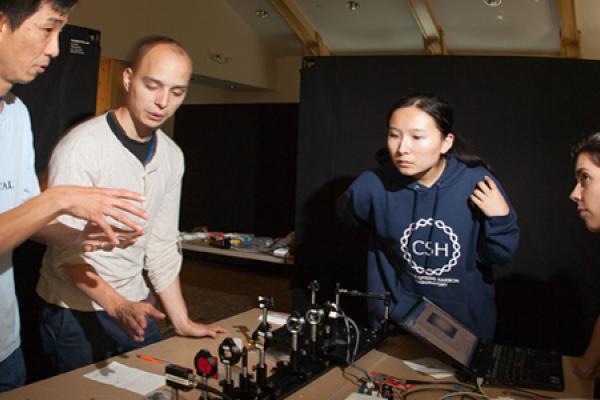Ashley Yates Attended Cold Spring Harbor Laboratory Proteomics Summer Session

TPS Student, Ashley Yates attended the Cold Spring Harbor Laboratory Proteomics Summer Session, July 14-27, 2015.
This intensive laboratory and lecture course focused on cutting-edge proteomic approaches and technologies. Students gained practical experience purifying and identifying protein complexes and posttranslational modifications. In a section focused on quantitative whole proteome analyses or top-down proteomics, students gained hands-on experience using two-dimensional gel electrophoresis and mass spectrometry analysis. Students used differential in-gel electrophoresis (DIGE) for gel-based protein quantification. Differentially expressed proteins were recognized by statistical methods using advanced gel analysis software and identified using MALDI mass spectrometry. For shotgun proteomic analysis sections or bottom-up proteomics, students used label-free and covalent isotopic-labeling quantitative approaches to differentially profile changes in protein complexes and whole proteomes. Students have been trained in high-sensitivity microcapillary liquid chromatography coupled with nanospray-ESI and tandem mass spectrometry analysis. Students learned both single-dimension and multidimensional separation methods. In a section focused on targeted proteomics, students learned to analyze and process shotgun proteomic data for the development of SRM/MRM assays that accurately identify and quantify targeted proteins. Students designed transitions for selected peptides and perform SRM/MRM mass spectrometry assays. They learned to process and interpret the acquired data to measure changing quantities of targeted proteins in a variety of biological samples. For all sections of the course, a strong emphasis was placed on data analysis.
A series of outside lecturers discussed various proteomics topics including: imaging by mass spectrometry, de novo sequence analysis, advanced mass spectrometry methods, protein arrays, and functional proteomics. The aim of the course was to provide each student with the fundamental knowledge and hands-on experience necessary for performing and analyzing proteomic experiments. The overall goal was to train students to identify new opportunities and applications for proteomic approaches in their biological research.
